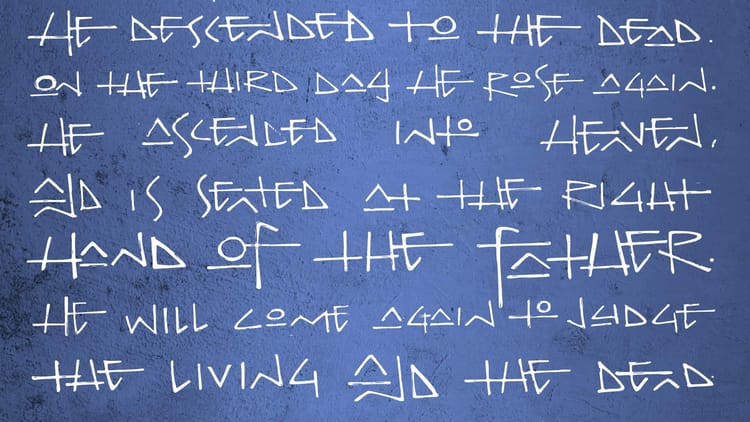Nothing More (Philippians 3:1-11)

Big Idea: Focus on knowing Christ rather than adding human rules and traditions.
One of the hardest things is to be clear about something. Sometimes it’s just as hard to stay clear.
Have you ever heard a sermon that started out clear – sort of – and went downhill from there? You may have experienced this in other areas. I don’t know if it’s just me, but I’ve gone to get something in my house, and by the time I get there, I’ve forgotten what I came for. Or even worse, I go out shopping with a mental list and come home without the very thing I went for.
This happens in the bigger areas of life. When we got married, we were all pretty clear on what we were committing to – for richer and poorer, better or worse, in sickness and health. It doesn’t always look that clear in daily life, does it? Many of us choose our careers to help others or teach children, but over time, job demands can make us forget our original motivations.
Within every one of us, there is a pull from clarity to fuzziness or confusion. It can be funny when the issues are minor, but it becomes serious when we’re addressing important matters. The consequences can be tragic.
When this happens in the church, it’s tragic. Most churches start out clear about their mission and their message, but eventually lose that clarity. Erwin McManus has said, “Most places have lost the essence of what it means to be a church.” If that’s true – and I think it is – it’s because we all face this pull from clarity, and we soon lose sight of what really matters and what we really should be doing.
The church has been given a mission. There’s really no confusion about what we should be doing. Over time, we tend to shift from passion to apathy, from sacrifice to comfort, and from service to selfishness. This is true in marriage, in life, and in the church.
Today's passage addresses this potential danger proactively, tackling it before it can arise. If you have a Bible with you, please take a look with me at Philippians 3.
Watch Out!
This is one of the hardest passages in Philippians. Paul is about to confront a danger to the church that hadn’t even happened yet. Verse one says, “Whatever happens, dear brothers and sisters, may the Lord give you joy. I never get tired of telling you this. I am doing this for your own good.” Paul is setting the stage here to deal with some unpleasant issues.
Verse two says, “Watch out for those dogs, those wicked men and their evil deeds, those mutilators who say you must be circumcised to be saved.” It doesn’t come across in English, but Paul uses some incredibly harsh language here. One translation says, “Barking dogs [wild dogs – not the domestic type]…religious busybodies… knife-happy circumcisers” (The Message). We read this, and we start to wonder why Paul’s so upset. We need to fill in some of the background to understand this passage.
Here’s some context. When Christianity started, it came out of the Jewish religion. In the early days, it was actually seen part of Judaism. To become a Christian without also becoming Jewish in those days was unthinkable.
The problem came when Gentiles began to enter the church. They initially questioned if Gentiles could become Christians, but the Holy Spirit confirmed it when the Gentiles spoke in tongues. There was no doubt that they had become part of what God was doing. But shouldn’t the Gentile Christians then become converts to Judaism? Isn’t that part of what it means to be a Christian?
Becoming circumcised is part of adopting Judaism. You think that baptism is demanding – imagine the deacons coming to meet with you about getting circumcised! Supporters of circumcision cited the verse, "Anyone who refuses to be circumcised will be cut off from the covenant family" (Genesis 17:14). This was a big issue in the church. The issue had already been settled 11 years earlier in Acts 15, yet some still tried to persuade Gentile believers to get circumcised.
This was going to be a huge issue in Philippi. Most of the people there were Gentile believers. It was probably only a matter of time before some arrived in the church to convince them to be circumcised.
Paul wasn’t exactly neutral on this issue. Why? He understood what it means to follow Jesus Christ and recognized the risks of imposing human requirements. Read verses 3 and 4 with me: “For it is we who are the circumcision, we who worship by the Spirit of God, who glory in Christ Jesus, and who put no confidence in the flesh—though I myself have reasons for such confidence.” Paul knew that there were only a few requirements for following Christ, and circumcision wasn’t one of them. What are the requirements? Worship through the Spirit of God, not human traditions or rituals; celebrate Jesus Christ and His achievements for us, and avoid relying on our own efforts to please God. You don’t have to be circumcised to be a follower of Christ.
This all sounds strange to us today, because this isn’t really an issue for us anymore. It's not a controversial topic in our community. But the same kind of thing is happening today. Today, it would mean saying, "You must follow Jesus Christ, but you also need to do something extra." It could involve walking down an aisle, signing a card or Bible, praying a specific prayer, singing in a certain style, or wearing particular clothing. It's easy to impose human or cultural requirements on becoming a follower of Jesus Christ. We’re going to look at that in just a minute.
Pushing Back
Some may have said, “Okay, Paul, we get your point, but you’re carrying this a little too far.” Or even, “You’re just saying that because you’re not one of us. You’ve never been on our side.”
Paul says, “If you want to talk about that, I’m on equal footing with any of you.”
Yet I could have confidence in myself if anyone could. If others have reason for confidence in their own efforts, I have even more! For I was circumcised when I was eight days old, having been born into a pure-blooded Jewish family that is a branch of the tribe of Benjamin. So I am a real Jew if there ever was one! What’s more, I was a member of the Pharisees, who demand the strictest obedience to the Jewish law. And zealous? Yes, in fact, I harshly persecuted the church. And I obeyed the Jewish law so carefully that I was never accused of any fault. (Philippians 3:4-6)
Paul had the right upbringing, nationality, family background, inheritance, orthodoxy, activity, and morality. He had all the right credentials, but instead of bringing him closer to God, they got in the way. The advantage became a disadvantage. His credentials and advantages led him to persecute the church and oppose what God was doing.
It would be like Paul saying today, “Don’t write me off, thinking that I don’t know the way church works. I haven’t missed church since the week I was born. I’ve attend every meeting and every program of the church. I’ve memorized large portions of the hymnal and the Bible.” All the credentials are there. Paul isn’t challenging from the outside. He’s challenging as someone who’s been steeped in the culture he’s challenging. He has credibility to speak to the issue.
Here’s how it works in our lives. When we come to Christ, he begins to change us. We know that there’s nothing that we did or could do to earn salvation. Over time, our characters begin to change. Then, after a while, we begin to confuse our changed characters with the entry requirements of faith. We begin to think that you have to act a certain way or look a certain way, or clean up your act enough to become a follower of Jesus Christ. We even begin to isolate ourselves from those who aren’t like us.
Eventually, we start to confuse the cultural markers of what it means to be a good person with what it means to be a Christian. The markers we use – what Christians should do and shouldn’t do – become as important as faith itself.
This is important. Is there anything wrong with these markers? Things like dressing a certain way, liking a certain type of music, attending certain meetings, doing certain things, not doing certain things? Just like in Paul’s day, was there anything wrong in itself with circumcision? Not at all. The issue isn’t the markers. The issue is our attitude toward them – that we begin to think that God is impressed by them, and that others are required to do them as well. It really becomes a problem when we lose clarity about what really matters, and we think that the markers are essential.
Let me give you an example. How many of us have ever heard this from our parents when we asked why we had to get dressed up for church. “What would you wear if you were going to meet the Queen?” I don’t know, I think I may have even used this with my kids at some point. There’s nothing wrong with getting dressed up. The problem is when we start to think that anything we wear could impress God. The problem is when we think that God is more impressed with the man in a suit and tie or a woman in a dress rather than somebody else in jeans and a t-shirt. There’s nothing that we could wear that earns us acceptance by God. It may matter to you – it may even be important to you – and there’s nothing wrong with that. But it’s wrong to think you’ve earned points with God, or that others should do as you do. Nothing we do out of human effort earns us acceptance with him.
The Alternative
What’s the alternative to living this way? Read verses 7-8:
I once thought all these things were so very important, but now I consider them worthless because of what Christ has done. Yes, everything else is worthless when compared with the priceless gain of knowing Christ Jesus my Lord. I have discarded everything else, counting it all as garbage, so that I may have Christ…
Everything – even Paul’s best credentials – are not just meaningless; they’re garbage. When translators worked on this verse, they had a challenge, because Paul didn’t use the word “garbage” in the original. He literally used a vulgar word that refers to body waste. It was a word designed to make his point forcibly. Our best human efforts, the markers we invent to define who’s in and who’s out – they’re not at all important. There may be nothing wrong with them in themselves, but when we make them issues, they’re worse than garbage. We’ve got to get rid of them.
What’s the alternative? Paul says it’s “the priceless gain of knowing Christ Jesus my Lord.” In other words, it’s about relationship. It’s not only an intellectual thing. It’s acknowledging him and obeying him. It’s what’s talked about in Jeremiah 31:34:
And they will not need to teach their neighbors, nor will they need to teach their family, saying, ‘You should know the LORD.’ For everyone, from the least to the greatest, will already know me,” says the LORD. “And I will forgive their wickedness and will never again remember their sins.”
Then Paul outlines the results of this relationship with Jesus. It’s two things. First, we gain Christ, he says. That means that one day, on the Day of Judgment when we’re being judged, we can cling to the righteousness that comes from faith in Christ, rather than our own actions and credentials. “I no longer count on my own goodness or my ability to obey God’s law, but I trust Christ to save me. For God’s way of making us right with himself depends on faith” (Philippians 3:9). It’s going to be a lot better to cling to Christ on that day than to brag about how well we attended church and how well we did other stuff. Paul says you can’t cling to both; it’s a lot better to cling to Christ.
Second, he says that our lives will take the shape of Christ’s life. “As a result, I can really know Christ and experience the mighty power that raised him from the dead. I can learn what it means to suffer with him, sharing in his death, so that, somehow, I can experience the resurrection from the dead!” (Philippians 3:10-11). Our lives will begin to actually look like his life. We can’t control many things in our lives, including how much we suffer. But we can control our passion, our willingness to give up our lives so that we can gain our lives. We can choose to crucify ourselves daily – die to our own self-interests – so that we can really live.
Bringing It Home
Let’s make this really practical. There’s something in your life that wants to add to the gospel. What is it? There’s something in all of us that wants to say, “You’re not one of us because…” Fill in the blanks. Because you look a certain way? Because you do (or don’t do) certain things? There’s a certain marker that’s important to you, that you probably think is essential to following Jesus Christ. It’s not actually commanded or essential, but we’ve made it that way.
This is hard – it’s hard for me. It’s hard because God has worked in our lives a certain way, and we begin to think that he will work in everybody’s life using the same programs, the same music, the same everything as he did with us. We become part of a certain culture which believes certain things are important, and it’s hard to step out of that culture and see that some things we thought were essential are more cultural than biblical. The things that are important to you may even be good. There’s nothing wrong with them. You may even have arguments and verses about why they’re important.
There’s nothing wrong with these things, except when we think that God smiles on those who act in a certain way – our way – and that he frowns on those who don’t. The problem is when we rely on our flesh. Flesh doesn’t mean the physical body. It means our best human efforts – our best worship, our highest wisdom, our best efforts.
We need to get down to two bedrock beliefs. First, God and I are not partners in salvation. Jesus did it all. There’s nothing I could add, even if I tried. Jesus did it all.
Second, to those of us who are tempted to add anything to the Gospel, any attempts to add human requirements are not additions to but rejections of the Gospel. The minute we try to add something to the Gospel, we’re actually rejecting the whole Gospel.
Paul said that he considered some things garbage, or worse. What are you going to take out to the garbage today? Not because there’s anything wrong with them in themselves, but because it’s garbage compared to knowing Christ and helping others to know him? The number of years you’ve been a Christian? The number of years you’ve been baptized? Your prayer life? The things you’ve done? What you know? What you don’t do?
Let’s boast about one thing only: “I know Jesus.” You may remember an old hymn:
Nothing in my hand I bring,
Simply to Thy cross I cling;
Naked, come to Thee for dress,
Helpless, look to Thee for grace;
Foul, I to the fountain fly;
Wash me, Savior, or I die.
Prayer:
It’s all about knowing you.
Pray that we would steer clear of keeping up appearances, living by our own efforts.
Pray that we would take out to the trash anything that we take credit for.
Pray that we will know you and lead others in their relationship with you.





